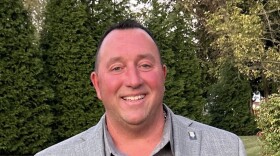Ed Harness spoke with LPM's Bill Burton about the Office of Inspector General.
Bill Burton: The Louisville Office of Inspector General was created after the death of Breonna Taylor. Ed Harness was named to be the first person to fill that role in 2021 and he joins us to discuss his work. It's a pleasure to speak with you. Thanks for joining us.
Ed Harness: Absolutely. Good morning. Thanks for having me.
BB: The Office of Inspector General is still fairly new to the city. Can you walk us through what the job entails?
EH: Well, we have a couple of charges under ordinance. We do investigations. We investigate six areas of alleged misconduct by Louisville Metro Police Department. We're also tasked with reviewing policies and procedures within the department with the ability to recommend improvements.
BB: Last year, the city of Louisville and the Department of Justice signed an agreement for a consent decree to reform Louisville Metro Police Department, but President Trump has recently signed an executive order that allows the US, Attorney General, to end any consent decree. How would you handle the situation?
EH: Well, that is a question that we're grappling with right now. How are we going to move forward? We have a charter ordinance, so we have that. We also have certain outline duties within the consent decree. Now, Mayor Greenberg has pledged that there will be a consent decree, unsure what that form will be, whether or not they will accept it as whole and adopt it, or whether they'll do it as piecemeal. And so that's really a big question right now, how will we move forward with the consent decree? What will that consent decree look like? What's the enforcement mechanism for the consent decree? Since there will not be a federal court order or a federal court to go to and say, 'Hey, the department's not making these improvements,' we need an enforcement action.
BB: If your office were in charge of police reform, what would you do?
EH: Well, I think immediately, we would adopt all the principles as negotiated in the consent decree. We have the ability to carry out the evaluations as outlined in the consent decree. We don't have enough staff to do that, so we would have to hire more staff, but we could carry out the duties as outlined in the consent decree. We do have certified investigators for internal affairs investigations. They're also certified by the Association of Inspector Generals as certified evaluators. So we can do that. We also have a Ph.D. on staff who could do our data analytics.
BB: In February, LMPD released the report that your office wrote on the Omari Cryer shooting in 2022. Cryer was killed when LMPD was serving an arrest warrant against him, and your report stated that LMPD should launch an investigation into possible false statements on the arrest warrant. But police chief Paul Humphrey pushed back pretty hard, saying that there would be no investigation. How do you handle that type of situation?
EH: That is a good question. At this point, it's handled. We don't have any other recourse but to make those recommendations, and despite what is clearly a disagreement regarding that incident and those incidents as we describe them, and I fully support the work that we did in the findings that we released, and even the chief, in his pushback, admitted there were some things that they needed to clean up. These are constitutional things. You don't just clean up constitutional matters. So what we will need is, as I said before, an enforcement mechanism, and if we don't have the federal courts, then we're going to have to find something else.
BB: What would be the ideal enforcement mechanism?
EH: Well, I think the mayor and the Metro Council are the enforcers at this point, as we sit today, so they'll have to take a greater role in holding the department to task.
BB: Your term as inspector general is coming to an end in November. The NAACP has called for you to be reappointed as inspector general, and now, as you come to the end of this term, how do you feel about the job? Would you like another term?
EH: Yes, I've asked to be reappointed. I've let the local Metro government know that the Civilian Review and Accountability Board has endorsed my reappointment, and they've let their intentions be known to the mayor. It's unfinished work, and I would like to continue and keep the progress going for the people of Louisville.
BB: That is Ed Harness, Louisville's Inspector General. Thank you so much for your time, Ed. It was a pleasure to speak with you.
EH: It was my pleasure. Thanks for having me.
This transcript was edited for clarity.






